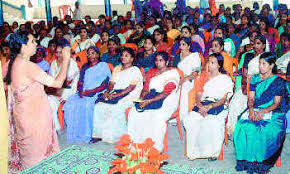
Mumbai’s bais, domestic workers, received a modicum of recognition when the state of Maharastra passed the Domestic Workers’ Welfare Board Bill at the end of December. Maharastra is the seventh state to pass a domestic workers’ bill. There are an estimated 500,000 domestic workers, mainly women, in Mumbai alone, and over a million across the state, according to government estimates. Domestic worker unions and associations, who have been lobbying for such a bill for twenty years, are supportive. Meanwhile, “State labour minister Nawab Malik, though, has termed this a “welfare measure”, adding that enforcement (punishment for violation) would not be considered at this stage.” When it comes to domestic workers, the rule of law always translates them into recipients, or worse clients, of welfare. The legislation emerged from women domestic workers’ decades long sustained campaigns.
There’s the rule of law and there’s the rule of household. Togo has confiage, or entrustment. Rural families send their daughters to live with urban relatives. The girls are supposed to get education, and in exchange they are to `perform’ domestic chores. Here’s what’s been documented: beatings, deprivation, rape. Guess what? The conditions of adult domestic workers, all women, is just as bad. In 2007 the Togolese government categorized domestic labor as one of the worst forms of labor. So, CARE International worked with a recruitment agency to help them improve their working conditions. Then the agency helped the domestic workers to organize a domestic workers’ union. Workers complain to the agency, and the agency places them in a different household. The offending household loses a domestic, for two seconds. No negotiations, no consultations, no strikes, no change in dominant order. No unions.
In the United States: “Employed mostly in private homes, domestic workers experience levels of exploitation and physical abuse rarely seen elsewhere. Mostly women and of color, they face those conditions without the protection of collective bargaining or other union tactics. As nannies, caregivers for the elderly, and housekeepers, they have remained almost invisible, their lives often akin to modern-day slavery. An estimated 1.5 million (U.S. Census Bureau) face these conditions.” As in Togo, as in India, domestic workers, mostly women, are organizing. In the U.S., the National Domestic Workers Alliance, the National Domestic Workers Congress, a myriad of local and regional organizations are women pulling women together. Mujeres unidas y activas.
In India, Togo, the United States, in recent decades, domestic labor has become a key of neoliberal economic `development.’ In Sweden, the neoliberal assault on women involved pigavdrag, maid deductions, and vårdnadsbidrag, care support. The state subsidizes private, individual childcare. Who suffers? Working class and low income women. What is under assault? Feminist political economy: “Vårdnadsbidraget delivers the final blow meant to send women back into the household. After the long struggle to free women from their homes, women are now offered 3000 Swedish crowns (ca 320 ) per month to stay at home with their children. This is obviously not an offer aimed at single mothers: it is impossible to survive on this sum in Sweden. Those lucky women who have a real man who brings home a big salary, however, can contentedly stay at home and accept the pocket money. And so women are again made financially dependent on men. The pigavdrag and the vårdnadsbidrag are both solutions only for the upper classes, who don’t want to pay the real price for a maid or send their children to a kindergarten. They represent the government’s mobilization of several types of oppression, which they have the guts to call a new `gender equality politics’.”
When it comes to domestic workers, the State translates labor law into welfare or goes on the attack. In India, Togo, the United States, Sweden, and everywhere else, women domestic workers are organizing their own structures.
(Photo Credit: The Hindu)

